In looking at time (no. 18) we saw how a suggested form of multiverse is one in which sub-cosmi are speculated — there is no observational base, this is philosophy dressed up in a lab coat — to pop up as fluctuations, exhibiting their own “big bang” events and timelines:
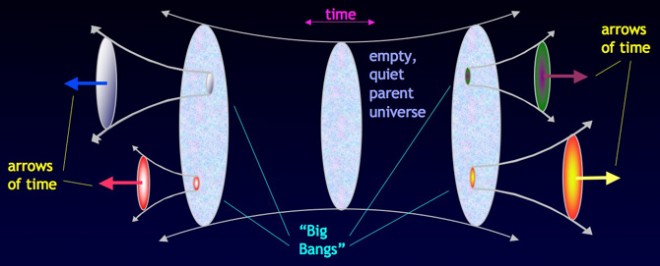
However, it was not as simple as that. Wikipedia, speaking against known inclinations, summarised:
a Boltzmann brain is a self-aware entity that arises due to extremely rare random fluctuations out of a state of thermodynamic equilibrium [–> the predominant, statistically overwhelming group of accessible micro-states for a relevant entity in statistical thermodynamics]. For example, in a homogeneous Newtonian soup, theoretically by sheer chance all the atoms could bounce off and stick to one another in such a way as to assemble a functioning human brain (though this would, on average, take vastly longer than the current lifetime of the universe). The idea is indirectly named after the Austrian physicist Ludwig Boltzmann (1844–1906), who in 1896 published a theory that the Universe is observed to be in a highly improbable non-equilibrium state because only when such states randomly occur can brains exist to be aware of the Universe. One criticism of Boltzmann’s “Boltzmann universe” hypothesis is that the most common thermal fluctuations are as close to equilibrium overall as possible; thus, by any reasonable criterion, human brains in a Boltzmann universe with myriad neighboring stars would be vastly outnumbered by “Boltzmann brains” existing alone in an empty universe.
Boltzmann brains gained new relevance around 2002, when some cosmologists started to become concerned that, in many existing theories about the Universe, human brains in the current Universe appear to be vastly outnumbered by Boltzmann brains in the future Universe who, by chance, have exactly the same perceptions that we do; this leads to the absurd conclusion that statistically we ourselves are likely to be Boltzmann brains. Such a reductio ad absurdum argument is sometimes used to argue against certain theories of the Universe. When applied to more recent theories about the multiverse, Boltzmann brain arguments are part of the unsolved measure problem of cosmology.
This is a rather familiar type of speculation in philosophy, the grand delusion world. Such exercises in radical skepticism about knowledge of things in themselves are fairly familiar in philosophy. We may look at the one familiar from the The Matrix series of films or more classically, from Plato’s parable of the Cave — which can be extended by using the concepts of the defective eye from Jesus’ Sermon on the Mount and the political/ social plausibility model, the Overton Window:
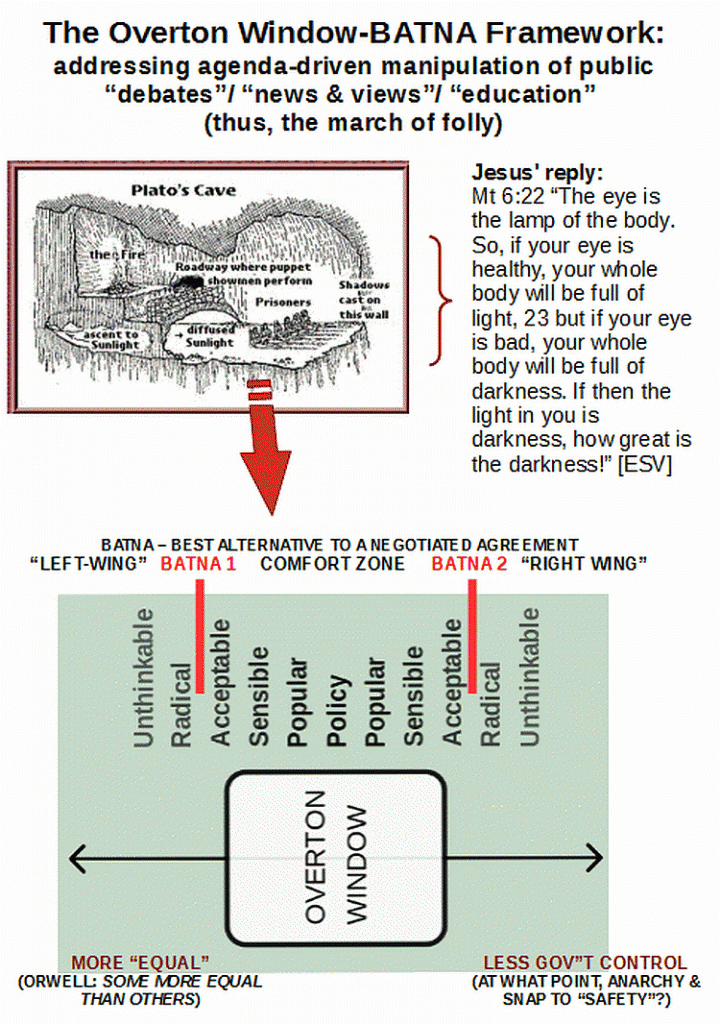
Now, obviously, the cosmological fluctuation model is deeply challenged by the gap between a Boltzmann brain world and the sort of going concern cosmos we seem to observe, reducing to the suggestion, that our world is little more than a delusional dream of such a brain. This extends the brain in a vat thesis:
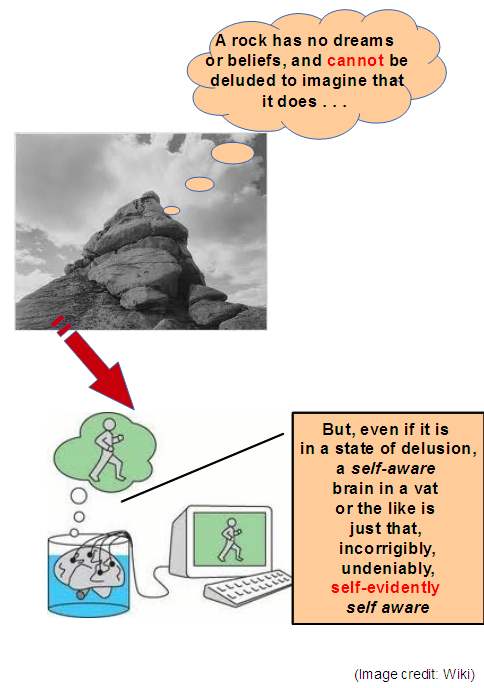
And, it also finds an echo in Godel’s epistemology on Logic and Mathematics:
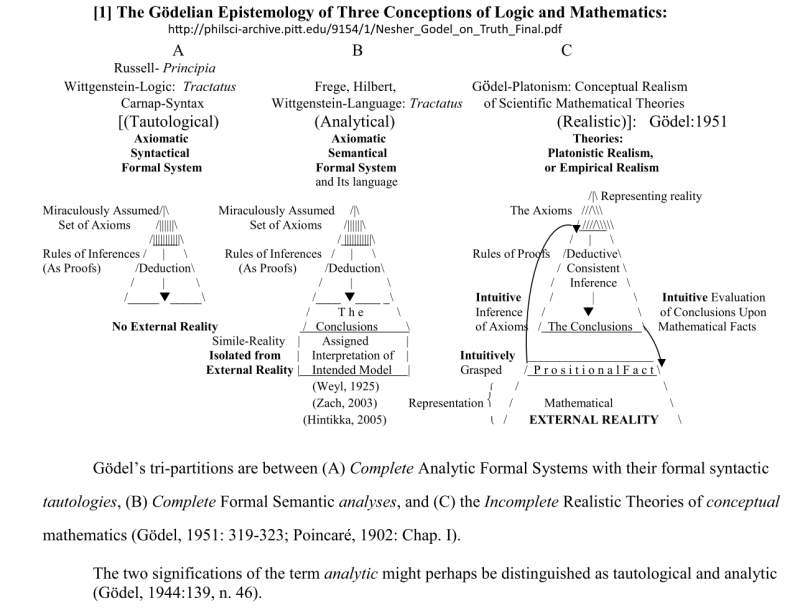
Perhaps, in the spirit of Descartes, we may highlight the fact of self-awareness, of consciousness.
That is, if one is conscious and self-aware, one cannot be deluded about this reality. Likewise, if an entity is not self-aware, it cannot have delusions by virtue of lacking such consciousness. A seemingly slender reed, but it is a start. For it is an example of a self-evident truth that is knowable, known and necessarily accurate to reality. Here, inner reality.
Following F H Bradley, we may then recognise:
We may agree, perhaps, to understand by metaphysics an attempt to know reality as against mere appearance, or the study of first principles or ultimate truths, or again the effort to comprehend the universe, not simply piecemeal or by fragments, but somehow as a whole [–> i.e. the focus of Metaphysics is critical studies of worldviews] . . . . The man who is ready to prove that metaphysical knowledge is wholly impossible . . . himself has, perhaps unknowingly, entered the arena . . . To say the reality is such that our knowledge cannot reach it, is a claim to know reality ; to urge that our knowledge is of a kind which must fail to transcend appearance, itself implies that transcendence. For, if we had no idea of a beyond, we should assuredly not know how to talk about failure or success. And the test, by which we distinguish them, must obviously be some acquaintance with the nature of the goal. Nay, the would-be sceptic, who presses on us the contradictions of our thoughts, himself asserts dogmatically. For these contradictions might be ultimate and absolute truth, if the nature of the reality were not known to be otherwise . . . [such] objections . . . are themselves, however unwillingly, metaphysical views, and . . . a little acquaintance with the subject commonly serves to dispel [them]. [Appearance and Reality, 2nd Edn, 1897 (1916 printing), pp. 1 – 2; INTRODUCTION. At Web Archive.]
In short, to infer that we cannot know external reality implies a claim to know a very important thing about said external reality, its un-know-ability. So, in the end it is impossible to not know about external reality, at least “in part.” So, too, we see that while error exists is also a humbling reality, it is also another self-evident truth, warranted to certainty. Thus, worldviews that reduce knowledge to subjectivism or a socially constructed Overton Window pseudo-reality, fail.
Their name, proverbially, is Legion.
And yes, we just saw off the underlying notions that drive dominant, widely held core beliefs of our time. Subjectivism, radical relativism, implicit solipsism, post modernism (actually, ultra-modernism, modernism set at 11 on the volume dial) all fail.
In short, our challenge is, how do we move from having bad eyes to having good ones that see accurately and with good warrant to recognise their credibility (as opposed to absolute reliability, optical delusions are already a warning).
What, then, can and should we do?
We see already, the crooked yardstick vs plumb-line principle. Namely, that if one makes a crooked yardstick his or her standard of what is straight, accurate or upright then what is genuinely so will never pass the test of conformity to crookedness. This instantly exposes a goal of the ruthless agit-prop operator, to use subtle deception and indoctrination under cover of the credibility of some authority or leader, to get us to set up crooked yardsticks as standards of truth, right reason, prudence, fairness etc.
The problem of such is, there are natural standards of uprightness and straightness, plumb-lines:

So, we can often detect mass deception (or personal deception) by use of plumb line self-evident truths. Accordingly, unsurprisingly, there are notions abroad that seek to undermine and dismiss the possibility and credibility of such truths. Truths of the order, 2 + 2 = 4, whatever Winston Smith’s torturers may want him to say or even believe otherwise. It is therefore a reliable sign of mass — as opposed to grand — delusion and deception, that self-evident truths (and clear facts otherwise) are despised or dismissed in a situation. This indicts much of today’s intellectual culture, already.
Let’s pause for an analysis of Orwell’s thinking behind 1984:
Here is the movie.
A closely related principle is that if a scheme of thought implies that we live in a grand delusion, or that such is most likely (or just significantly likely) the case, it is suspect.
For, it necessarily self-refers, leading to an infinite regress of Plato’s Cave world level delusions that undermine core rationality. So, on the common sense rule, we hold that albeit subject to error, our perceptions of the world and our ability to know and to reason are credible. Even in the matrix or Plato’s cave, there is a moment of recognition trusting one’s senses and common sense reasoning, to recognise the cheat.
A sounder premise, then, is to recognise that while we must be open to correction of errors, we should hold to the credibility of our rationality and conscious awareness, senses and common sense. Thus, we are led to analyse worldview options on comparative difficulties, in light of the force of the Agrippa trilemma of warrant:

On such a premise, we may confidently turn around the Carroll type fluctuation driven multiverse. Such a worldview implies (but is unlikely to seriously discuss) that with overwhelming likelihood, if we sense a world, it is because we are a deluded Boltzmann brain — so much for the physicalist answer to the anthropic principle. So, the very credibility of the science being appealed to by the physicalist evolutionary materialist, collapses.
Instead, we have good reason to see that we live in a world that credibly had a beginning perhaps 13.77 BYA, as is illustrated:
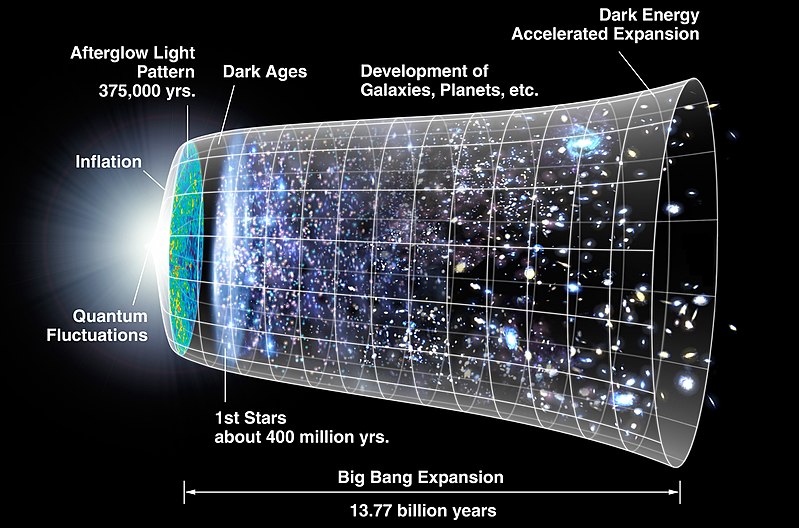
That world turns out to be fine tuned in many ways that make C-chemistry, aqueous medium, cell based terrestrial planet life possible:
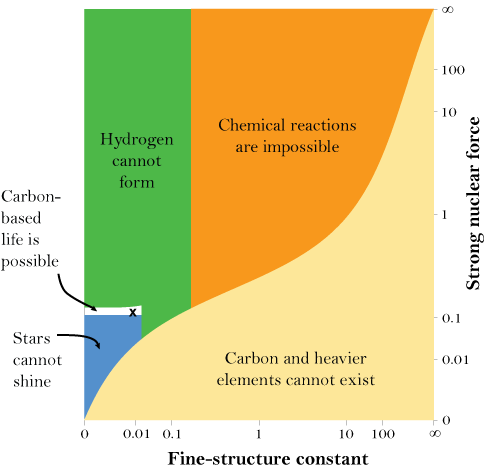
This strongly suggests that design of the cosmos is a serious candidate to explain what we see. Never mind, those who would marginalise and dismiss.
Likewise, we find ourselves as going-concern, conscious, self-aware, rational, responsible, significantly free creatures.
We find ourselves governed by a law of our morally governed nature. Starting with, our known, undeniable duties to truth, right reason, prudence, fairness and justice, etc. This surfaces a point made by Cicero, c. 50 BC:
—Marcus [in de Legibus, introductory remarks,. C1 BC]: . . . the subject of our present discussion . . . comprehends the universal principles of equity and law. In such a discussion therefore on the great moral law of nature, the practice of the civil law can occupy but an insignificant and subordinate station. For according to our idea, we shall have to explain the true nature of moral justice, which is congenial and correspondent [36]with the true nature of man. We shall have to examine those principles of legislation by which all political states should be governed. And last of all, shall we have to speak of those laws and customs which are framed for the use and convenience of particular peoples, which regulate the civic and municipal affairs of the citizens, and which are known by the title of civil laws.
Quintus [his real-life brother]. —You take a noble view of the subject, my brother, and go to the fountain–head of moral truth, in order to throw light on the whole science of jurisprudence: while those who confine their legal studies to the civil law too often grow less familiar with the arts of justice than with those of litigation.
Marcus. —Your observation, my Quintus, is not quite correct. It is not so much the science of law that produces litigation, as the ignorance of it, (potius ignoratio juris litigiosa est quam scientia) . . . .
With respect to the true principle of justice, many learned men have maintained that it springs from Law. I hardly know if their opinion be not correct, at least, according to their own definition; for “Law (say they) is the highest reason, implanted in nature, which prescribes those things which ought to be done, and forbids the contrary.” This, they think, is apparent from the converse of the proposition; because this same reason, when it [37]is confirmed and established in men’s minds, is the law of all their actions. They therefore conceive that the voice of conscience is a law, that moral prudence is a law, whose operation is to urge us to good actions, and restrain us from evil ones. They think, too, that the Greek name for law (NOMOS), which is derived from NEMO, to distribute, implies the very nature of the thing, that is, to give every man his due. [–> this implies a definition of justice as the due balance of rights, freedoms and responsibilities] For my part, I imagine that the moral essence of law is better expressed by its Latin name, (lex), which conveys the idea of selection or discrimination. According to the Greeks, therefore, the name of law implies an equitable distribution of goods: according to the Romans, an equitable discrimination between good and evil. The true definition of law should, however, include both these characteristics. And this being granted as an almost self–evident proposition, the origin of justice is to be sought in the divine law of eternal and immutable morality. This indeed is the true energy of nature, the very soul and essence of wisdom, the test of virtue and vice.
We therefore face the IS-OUGHT gap, and the point that since Hume, there is but one location that it can be bridged, the root of reality. We have a bill to fill: a world-root that grounds is and ought alike, as we are morally governed beings and such moral government governs even our reasoning. So, on pain of grand delusion and absurdity, we need a morally sufficient world root.
It is doubtless unwelcome in many quarters for me to speak in the following terms, but this is a philosophical exercise so if you have a serious alternative post it: ________ and show why it holds up under comparative difficulties: _________ (Hint: much harder to do than may at first seem apparent.)
My own suggestion is that there is but one serious candidate to be such a world root. Namely, the inherently good and utterly wise creator God, a necessary (so, eternal) and maximally great being. One therefore worthy of our loyalty and responsible reasonable service by doing the good that accords with our evident nature. The God of ethical theism.
So, we can have a serious alternative to living in a grand delusion Boltzmann brain world, or in some other form of the same notion. But that is likely to point in directions that many will find unappealing in today’s post-modern world.
Food for thought. END